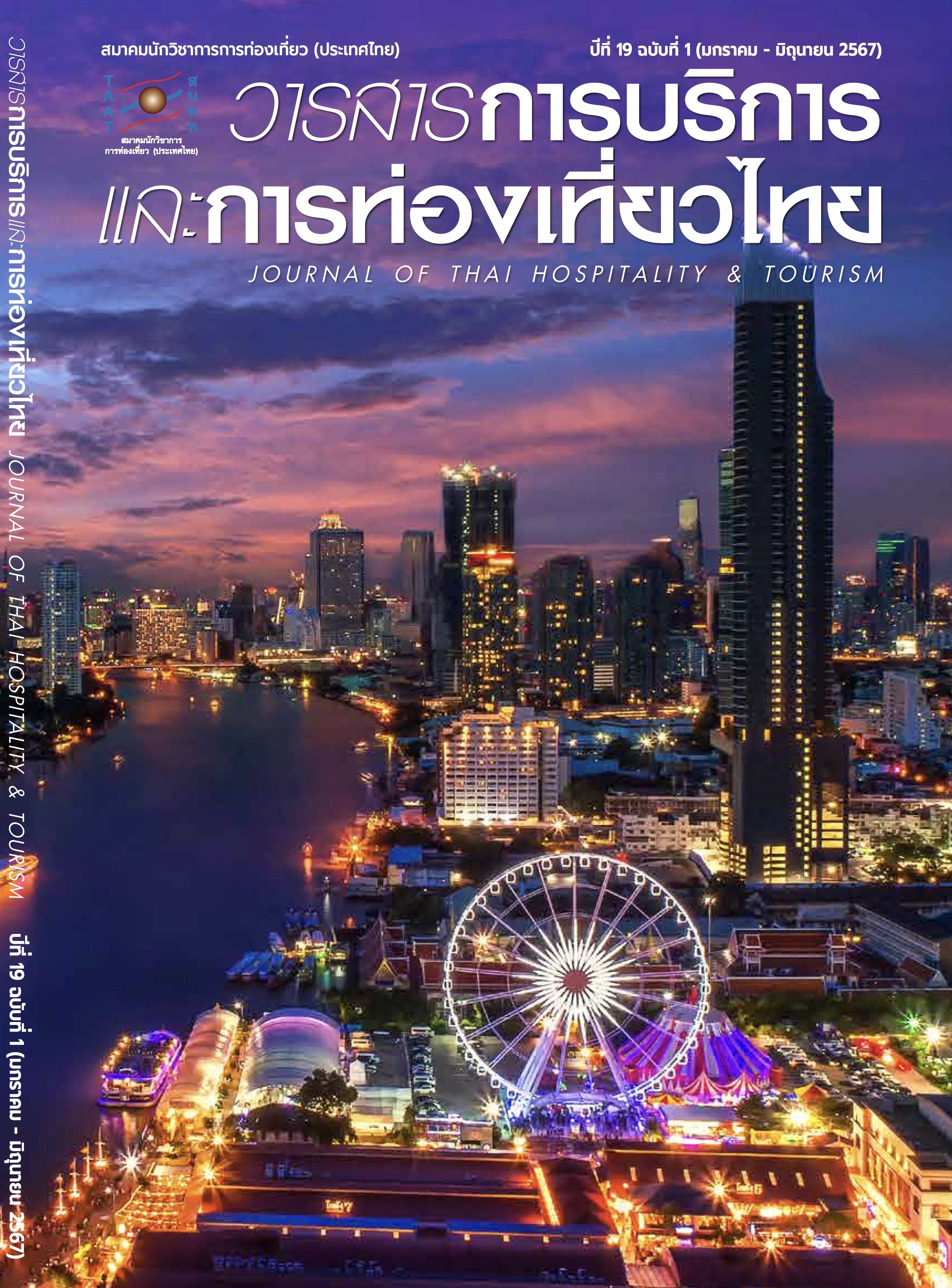แนวทางการพัฒนาเส้นทางท่องเที่ยวสีเขียวหมู่บ้านวังใหญ่ ตำบลหนองกุงทับม้า อำเภอวังสามหมอ จังหวัดอุดรธานี
Main Article Content
บทคัดย่อ
แนวทางการพัฒนาเส้นทางท่องเที่ยวสีเขียวหมู่บ้านวังใหญ่ ตำบลหนองกุงทับม้า อำเภอวังสามหมอ จังหวัดอุดรธานี มีวัตถุประสงค์เพื่อค้นหาทรัพยากรการท่องเที่ยวในด้าน 3 ธรรม คือ ธรรมะ อารยธรรม ธรรมชาติ หมู่บ้านวังใหญ่ ตำบลหนองกุงทับม้า อำเภอวังสามหมอ จังหวัดอุดรธานี และนำเสนอแนวทางการพัฒนาเส้นทางท่องเที่ยวสีเขียวโดยเป็นการวิจัยเชิงคุณภาพ เครื่องมีอการวิจัยคือ แบบสัมภาษณ์แบบมีโครงสร้าง แบบสังเกต การอภิปรายกลุ่ม โดยการตรวจสอบข้อมูลแบบสามเส้า และเก็บข้อมูลในช่วงกุมภาพันธ์-พฤษภาคม 2565 ณ แหล่งท่องเที่ยว หมู่บ้านวังใหญ่ ผลการวิจัยพบว่า ทรัพยากรการท่องเที่ยวในหมู่บ้านวังใหญ่ ตำบลหนองกุงทับม้า อำเภอวังสามหมอ จังหวัดอุดรธานี สามารถแยกได้เป็น 3 หมวด คือ ธรรมะ อารยธรรม ธรรมชาติ โดยหมวดธรรมะคือวัดต่าง ๆ รอบหมู่บ้านที่ยังต้องการการพัฒนาเพื่อเพิ่มศักยภาพในการรองรับนักท่องเที่ยวในขณะที่ทรัพยากรหมวดอารยธรรม ธรรมชาตินั้นมีความพร้อมเหมาะสมสำหรับการพัฒนาเป็นเส้นทางท่องเที่ยวสีเขียวเพื่อดึงดูดนักท่องเที่ยว ดังนั้นจึงต้องการการสนับสนุนจากภาครัฐและเอกชนในการพัฒนา เช่น การปรับภูมิทัศน์เพิ่มความร่มรื่นของพื้นที่ การเพิ่มกิจกรรมการท่องเที่ยวที่หลากหลาย การพัฒนาผลิตภัณฑ์ของที่ระลึก เพื่อเพิ่มประสิทธิภาพในการจัดการการท่องเที่ยวของหมู่บ้านวังใหญ่ ตำบลหนองกุงทับม้า อำเภอวังสามหมอ จังหวัดอุดรธานี
Article Details

อนุญาตภายใต้เงื่อนไข Creative Commons Attribution-NonCommercial-NoDerivatives 4.0 International License.
เอกสารอ้างอิง
Benjachaya, S. (2006). Ecotourism, in the Course Materials “Community Forest Management and Forest Career Development” Fiscal Year 2006. Royal Forest Development.
Chairatana, P. & Na Thalang, C. (2017). Potential of Tourism Resources in Udon Thani. Dusit Thani College Journal, 11(2), 124–142.
Jang, T. (2020). “Green Tourism” Concept Revealed: Eco-Friendly Tourism after COVID-19. https://www.bltbangkok.com/news/24399/
Ministry of Tourism and Sports (MOTS). (2017). Strategy for Promoting Green Tourism – 7 Greens (2017–2021). https://7greens.tourismthailand.org
Niemmanee, T. & Bowornchokchai, K. (2017). Guidelines for Agrotourism Development by the Participation to be the Green Agriculture City, Bang Khonthi District, Samut Songkhram Province. Suan Sunandha Rajabhat University.
Research and Development Coordination Project. (1997). Community – Based – Tourism: Concept and Experience. Ming Muang Navarat Co., Ltd.
Sarobol, S. (2003). Community – Based Tourism Concept and Experience of the Northern Area. Thailand Research Fund.
Suansri, P. (2003). Community Based Tourism Handbook. Thailand Research Fund.
Tongyai Na Ayuthaya, S. (2020). SRT Listens to High-Speed Rail Comments 2nd Time in Udon Thani. Retrieved from https://thainews.prd.go.th/th/news/detail/TCATG201224194515145
Wasee, P. (2016). Community Based Tourism. http://www.codi.or.th/index.php/publicrelations/news/14912-2016-07-15-11-12-40
Yonchayawong, P. (2022). Guidelines for the Development of Sustainable Green Tourism in Nakhon Chai Burin. Journal of Graduate Studies Valaya Alongkorn Rajabhat University, 16(1), 100–116.


